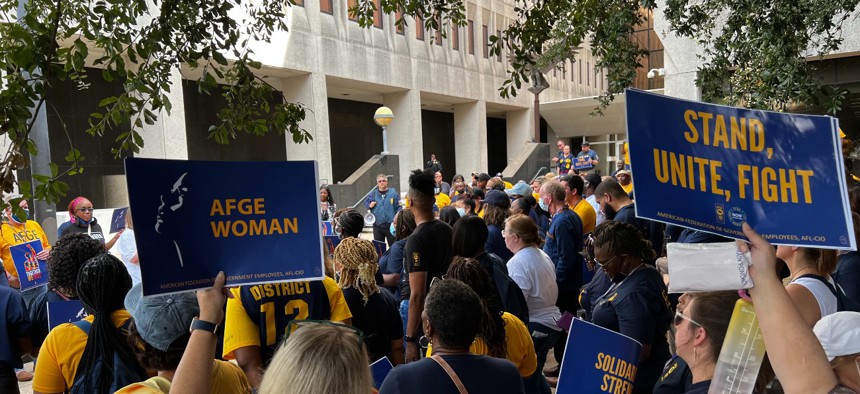
AFGE activists take to the streets of New Orleans to raise their voices about workers' rights. Chelsea Bland / AFGE
A Conservative Group Wants to Make It Easier for Feds to Bust Their Own Unions
Union officials said the agency at the heart of a case asking when employees can seek to decertify their unions after a bargaining unit consolidation could have a conflict of interest.
A conservative organization devoted to combatting organized labor is urging the Federal Labor Relations Authority to open federal employee unions that have recently consolidated multiple bargaining units within an agency to decertification petitions from individual employees.
In July, the Federal Labor Relations Authority solicited legal briefs in a case for which it had no legal precedent: can people file decertification petitions against their unions if the union has consolidated bargaining units within an agency without an accompanying election within the last year?
In early 2021, employees at the National Park Service’s Blue Ridge Parkway facility sought to change their union representation from the National Association of Government Employees to the American Federation of Government Employees. AFGE officials then submitted a request to the FLRA to consolidate that bargaining unit with an existing AFGE unit at the facility, which went undisputed and was certified by the FLRA in September 2021.
But in December, Erin Lamm, then a member of one of the bargaining units, filed a petition with the FLRA to decertify the newly consolidated union local. An FLRA regional director denied that petition, citing the longstanding bar against decertification petitions within 12 months of a union’s certification.
Lamm is backed by the National Right to Work Legal Defense Foundation, a conservative anti-labor organization, which is representing her in the case. The organization argued in its legal brief that Congress only intended there to be a bar on decertification petitions within 12 months of a union election, and that a post-certification bar is not appropriate in cases when unions simply consolidate existing bargaining units.
“Here, Congress spoke directly to when a bar should be applied and when it should not,” the group wrote. “Each bar in the statute specifically applies to secret ballot representation elections . . . [The section governing union consolidations] is a different subsection of the statute. Thus, not only did Congress refrain from imposing an election bar to a Section 7112 unit consolidation, but it also explicitly excluded Section 7112 from the bars it created by limiting Section 7111 bars to the particular subsection.”
The organization also argued that by preventing decertification petitions within 12 months of a unit consolidation, unions could strategically move to consolidate bargaining units shortly before the expiration of a union contract—during which there is a three-year bar against decertification petitions—in an effort to block federal employees from trying to decertify them.
But AFGE wrote in its own brief that Congress gave the FLRA broad authority to issue regulations to advance the policies advanced by the 1978 Civil Service Reform Act, and that an election bar following the certification of a newly consolidated bargaining unit is needed to provide stability to both agencies and labor organizations as they negotiate a new contract governing the larger unit.
“Far from a shuffling of paper, pursuing consolidation is, in reality, fraught with challenges and perils that are strikingly similar to those faced by other new [bargaining] units,” AFGE wrote. “[These] significant substantive changes, combined with the fact that there may be units or individuals who are opposed [to] consolidation, make the immediate post-consolidation period a time of marked risk for the exclusive representative. A newly consolidated unit is, in fact, under enormous pressure to produce results to demonstrate to the employees that the change will benefit them and not adversely affect their rights or representation. This requires, as with any new unit, a fair opportunity to demonstrate to employees the benefits of consolidation.”
Revoking the 12-month bar on election petitions following a unit consolidation could lead to a chilling effect, making unions less likely to sign onto federal employees’ requests to combine union locals, despite the fact that federal labor law encourages consolidations because fewer, larger unions promote efficiency and uniformity in personnel and workplace policies.
Allowing Lamm’s petition to proceed could also pose a number of other problems, said Cathie McQuiston, AFGE's deputy general counsel.
In the months since she submitted her petition to decertify the union, Lamm has been promoted out of the bargaining unit into a management position within the National Park Service’s regional human resources office, making her unable to participate in any potential election regarding the future of the union. And in the year since the bargaining units were consolidated, the agency has declined requests to negotiate a new union contract to cover all members of the new bargaining unit, prompting an unfair labor practice complaint from AFGE.
“Not only should she not have standing [to pursue her petition], but it’s also potentially an unfair labor practice, because management is required to remain neutral on union representation matters,” McQuiston said. “Everyone at the agency knew that she had this petition. So why is she being promoted and allowed to continue to advocate for this?”
National Right to Work Foundation spokesman Jacob Comello said that if the case proceeds past the question of whether a decertification petition can be filed, another employee in the bargaining unit has already volunteered to replace Lamm as the lead petitioner.
"The fact that the petitioners change doesn't change the fact that at least 30% of this unit signed a petition indicating they want a vote to remove AFGE from power of them," he said.







